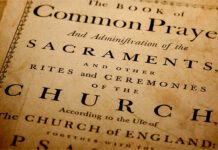If you follow Worship Matters with any kind of regularity you may have noticed a dearth of posts over the past few weeks. Most of April was taken up by the New Word Alive conference (Apr. 10-15) in Pwllheli, North Wales, followed by 13 days with my best friend, Julie, celebrating our 35th wedding anniversary four months early. We spent a week in Italy and 5 days in England, flying out the day before the royal wedding. For some reason we weren’t invited.
I wanted to take this post to share a few thoughts on New Word Alive.
Over 5000 (families and college students) gathered for a week of biblical teaching, worship in song, seminars, and fellowship. The evening teachings focused on Heroes of the Faith from Hebrews 11. Since this was my first time at NWA I wasn’t completely sure what to expect. I had never led the singing for this or any large event in the UK. Here are a few things I learned or was reminded of.
1. Music is regional. The gospel is universal.
While it helped to know what songs people at the conference were familiar with, throughout the week I tried to draw attention to the finished work of Christ and its implications for our lives. As we focused on his substitutionary sacrifice and victorious resurrection, the music became secondary.
2. Good planning leads to peaceful meetings.
Everyone who was involved in one of the two meetings each night (I led at both), met for 45 minutes at noon to go over the details of the evening. I’ve never done that at a conference before and was grateful for the clarity and grace it brought to the process. There was a lot going on, but everyone knew where they were supposed to be and when.
3. Humble people make serving together easier.
At the second planning meeting, someone asked me if I had any thoughts on how the meetings were structured. Since this was my first NWA, I was surprised not only by the question, but by their eagerness to apply changes I suggested. Leading together is meant to be teamwork, not a competition. On the music end, it was a tough schedule. Two meetings every night and leading close to 100 songs. Even though I had only played with one of the band members (Dave Williams from Christ Church), the other musicians (Ben, Mike, Jenny, Andy, and Alison) were responsive, joyful, and hard working. Not to mention punctual.
4. Good leading requires trust and knowledge.
Early on I wasn’t quite sure how the attendees were perceiving my leadership (me being an American, and all). That uncertainty was confirmed when people started making “suggestions” for how I might serve them more effectively. Through their comments I learned more about the diverse group I was serving that included about 1300 college students (mostly at the second meeting) and hymns-only saints who had been in conservative churches for over 50 years. That knowledge helped me choose songs that better served our time together.
5. A week is enough time to challenge traditions and presuppositions.
I noticed on the first night that while people sang loudly, all physical and vocal expression ceased as soon as a song ended. I knew that this reflected many people’s experience in their home church, but also knew that some were holding back. So in the student meeting on Wednesday night, I compared it to shouting while your team was about to score the winning goal and then shutting down as soon as they actually scored. There is a place for spontaneous celebration after a song given the glorious realities we’re proclaiming. So I gave them “permission” to allow their passion for Christ to overflow in shouts of acclamation or applause, even when the song ended. Not only did they respond, but on Friday morning even more conservative attendees joined in a spontaneous eruption of expressive praise after the last song of the conference.
6. Lead in a way that imparts faith to struggling people.
I can be tempted to think that everyone in a meeting is doing fine, and that singing is just the Christian thing to do. But I talked to individuals facing major trials who were greatly encouraged by the songs we sang. I learned later that a girl had seriously contemplated suicide at the conference. We never know how God might use the songs we’re singing to reveal the glories of Christ to hopeless, despairing people.
7. Not being able to please everyone isn’t the same as not caring.
Because the group was so diverse, I knew that some people at the conference would never appreciate my leadership or the songs I chose. One guy even confessed that he had said unkind things about me to his wife. That’s okay. Knowing I can’t make everyone happy doesn’t mean I can’t continue to strive to show them the glory of Jesus. I ended up doing different songs in the two meetings which was more work for the band, but served the attendees more effectively.
8. Songs don’t have to be familiar to be effective.
I taught a new song after an interview with Ben Kwashi, a Nigerian pastor who has experienced significant persecution for his faith. The song (Jesus, I My Cross Have Taken) is a 6 verse hymn set to new music by Bill Moore. I don’t typically recommend teaching a new song after a message, but the song was easy to learn and enabled us to express our willingness to suffer for the gospel. We ended up singing it two more times.
Grateful to God for the folks who put New Word Alive on each year and the opportunity to serve with them this year.
I’ll list the songs we sang at the conference in another post.











